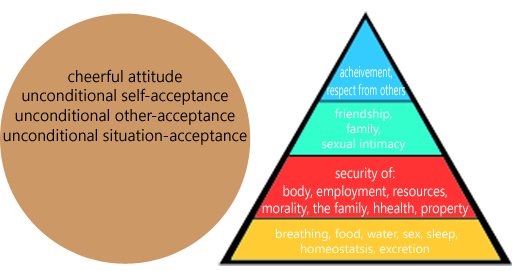Material “Happiness”
W
ild animals struggle to fend off predators, feed themselves, shelter themselves, mate, and protect their offspring. In contrast we humans, depending of course on our economic circumstances, meet our physiological and safety needs comparatively easily, and then have extra time on our hands. And so, because we can, we seek more.
The psychologist Abraham Maslow proposed a hierarchy of human needs, which might be visualized as a pyramid with the physiological needs at the bottom and the more “spiritual” needs toward the top.
Humans want more than just survival. We want dream jobs, exciting and nurturing romantic relationships, supportive families, and delightful friends. We strive to acquire comfort, desirable possessions, notable achievements, good health, and long life. We want love, approval, attention, and applause. We want to like ourselves. We want to crawl to the top of that pyramid.
This is all fine and well, but it is part and parcel with the erroneous belief that happiness is something that exists “out there.” It is a “seek more” mentality. It leads to materialism and consumerism.
Materialism is a focus on what we possess and how our lives appear from the outside. Even relationships are viewed as acquisitions. An obsession with acquisition is the source of misery. We are constantly tormented by superficial ideals of the relationships we should have (but don’t), the success we should have (but don’t), the things we should own (but don’t), the jobs we should have (but don’t), the wealth we should have (but don’t), and the people we should be (but aren’t).
Materialism is a motivator, but it is a bad one. It compels us to act out of the terror of inadequacy. This of course is not a recipe for happiness but for unhappiness.
Consumerism is the utterly bankrupt effort to fulfill all of our needs materially when in fact only a few of our needs are material. Shopping can be a fun distraction but it is not a pathway to real happiness. You are not your stuff.
My problem with Maslow’s hierarchy of needs is that it implies that love and belonging (which depend upon other people) are absolutely required, and that a whole host of material needs are met, before we can attain self-actualization. You must pass the middle of the pyramid before you reach the top. I don’t think this is how it works in reality, exactly. While our other human needs can be expressed in a pyramid, happiness – the self-actualized state of mind – is better represented by a circle off to the side: it is one whole thing, without a hierarchal structure, mostly independent of our other needs and desires. I said “mostly independent” because I’ll concede that it’s hard to be happy if you’re suffocating, but I believe it’s possible to be happy even if you’re hungry, thirsty, sleepy, gassy, dirt poor, friendless, disrespected, etc.
Go ahead and climb the pyramid of material well-being as you wish. Pursue the relationships, the achievements, and the possessions you most desire. But don’t wait for happiness. None of those things will give it to you. It can be attained without any of them, right here, right now. In fact, it can only be attained in the here and now.
 Copyright secured by Digiprove © 2012 William Bloom
Copyright secured by Digiprove © 2012 William Bloom

